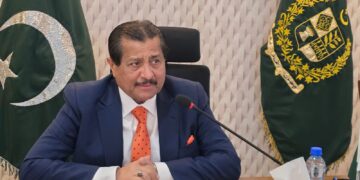In Getzen Lecture, Wray discusses how the FBI helps hold law enforcement, public officials—and itself—accountable.
USA : The FBI pursues the cause of government accountability by investigating abuses of power by law enforcement officers and the corruption of public officials, and by holding our own workforce to a higher standard, FBI Director Christopher Wray said during the University of Georgia’s 2024 Getzen Lecture on Government Accountability on March 19. The lecture—which is held annually at the school’s Athens, Georgia, campus—invites current and former government leaders and other experts to share their thoughts on government accountability.
“Our mission at the FBI is a broad one—to protect the American people and uphold the Constitution of the United States,” Wray said. “It covers everything from cyber to counterintelligence to counterterrorism to working with our partners to tackle violent crime. And, particularly relevant to this afternoon, it includes protecting the vulnerable and holding the powerful accountable.”
In the United States, the rule of law comes first and applies to everyone—regardless of their socioeconomic status or position of power (or lack thereof), Wray said. This approach differentiates our nation from “authoritarian regimes, like Russia and China, where the rule of law is subordinated to their leaders’ despotic will,” he added. But to maintain the public’s trust in our justice system, he said, the FBI must demonstrate that it holds powerful people accountable when they break the law.
“While there will always be people out there looking to exploit their positions of public trust by serving themselves rather than the American people, with an agency like the FBI on the job—and with institutions like UGA shining a light on why government accountability is so important in the first place—I like our chances,” Wray said.
Holding Law Enforcement Accountable
The FBI leads federal government efforts to investigate civil rights violations, including the responsibility to investigate what are known as color of law violations.
“Those crimes occur when an individual acting under the authority of federal, state, or local laws—under what’s known as the color of law—willfully deprives someone of their constitutional rights,” he explained. “And that deprivation of rights can run the gamut, from excessive force, false arrest, or obstruction of justice to sexual assault, withholding medical care or the failure to keep an individual from harm.
While color-of-law violations can be committed by anybody acting under their lawful authority— including probation and corrections officers, public officials, prosecutors, and judges—they too often involve law enforcement officers.”
He then described an FBI Jackson Field Office investigation into a group of white law enforcement officers who in January 2023 “kicked in the door of a home where two Black men were staying and subjected them to an hour and a half of pure hell”—including physical and psychological abuse—even though the officers had “no probable cause to believe either had committed a crime.”
The officers then went to extraordinary lengths to cover up their actions, including (but not limited to) destroying evidence, planting a gun on a victim, filing fraudulent reports, lying to investigators, and charging a victim with crimes he didn’t commit, Wray said.
“All of that came out through the course of the FBI’s investigation,” Wray said, adding that the FBI also learned “three of the officers had committed color of law violations just a month earlier.”
The investigation, which Wray said was a group effort between the FBI and “our state and federal partners” resulted in guilty pleas from all six officers, who are now awaiting sentencing.
“I recognize that what happened in Mississippi is an extreme example,” he said. “In fact, it’s hard to imagine a more atrocious set of civil rights violations than those carried out by these guys. But, on the flip side, it’s hard to imagine more important work than investigating those crimes and seeking justice for the victims.”
These criminals don’t represent “the vast majority of law enforcement officers,” Wray stressed.
“I’m the leader of the country’s premier law enforcement agency, and I’ve spent most of my career working shoulder to shoulder with law enforcement officers … so I’ve seen firsthand what they’re made of and what they do to make our communities safer,” he said. These ingredients, he said, include selflessness, courage, character, dedication, and service.
Wray added that officers are overworked and underpaid, largely operate outside the spotlight, and are rarely recognized or credited for their efforts. Yet, he said, they do their jobs knowing that each time they bid their families farewell to head to work, they might be doing so for the last time. “It takes a pretty extraordinary person to choose that life,” he said.
Wray said the contrast between officers who wear the badge to serve and protect and those who wield their power to harm others makes color of law violations harmful to both their immediate victims and the public’s faith in the way our country holds criminals to account.
“We’ve entrusted law enforcement officers with vast power and authority,” Wray said. “And when they abuse it—when they operate as though they’re above the law—they’re not just depriving victims of their civil rights. They’re degrading the public’s trust in our criminal justice system, one violation at a time.”
Holding Public Officials Accountable
Investigating public corruption is the FBI’s top criminal priority because of its dollars-and-cents cost to our nation’s’ government and taxpayers, which estimates put “at billions of dollars every year,” Wray said.
Public corruption—which can be carried out by public officials, regardless of how they get their jobs—can also infect and impact everything from border security and neighborhood protection to courtroom deliberations and even the quality of public infrastructure, he added. But at its core, public corruption denigrates the American people’s trust in their government and “undermines the strength of our democracy,” he said.
The “secretive nature” of many public corruption violations can make them tricky to detect and prove, Wray said, but the Bureau’s long track record of investigating these types of crimes gives us an advantage.
“On any given day, we’re working about 3,500 public corruption investigations with our federal, state, and local partners across the country—and our efforts pay off,” he said. “Over the past five years, we’ve disrupted nearly 2,000 criminal schemes and helped secure more than 3,000 convictions in this arena.”
Those convictions include that of former Ohio House Speaker Larry Householder, who, Wray said, led “the most elaborate and extensive corruption scandal the state has ever seen.”
Householder orchestrated a bribery scheme in which FirstEnergy—a company that owned two “failing nuclear power plants”—regularly paid off a tax-exempt organization run by Householder. In exchange, Householder’s organization worked to helped get a bill passed that provided “a billion-dollar bailout” for the troubled facilities, Wray explained.
These corporate funds helped bankroll Householder’s bid for speaker and other state House candidates’ campaigns and pad the pockets of Householder and his team.
“All in all, the FBI’s investigation found FirstEnergy paid upwards of $61 million in bribes to bail out their plants and to put and keep in office politicians like Householder who’d be loyal to the company over their constituents,” Wray said.
But what the corrupt politicians and his cronies didn’t know was that the FBI had an inside source who “cooperated with our agents, recorded incriminating phone calls and conversations, and shared text messages sent by members of the conspiracy,” Wray said. As a result, he said, Householder was eventually convicted of racketeering and sentenced to 20 years in federal prison. FirstEnergy signed a deferred prosecution settlement and agreed to pay a $230 million penalty for conspiring to bribe elected officials and others.
Holding Ourselves Accountable
The FBI’s authority and power enable our public corruption investigations, but they also rightly force us to carry tremendous responsibility and undergo careful scrutiny, Wray said.
“The work of the FBI is subject to a wide range of internal and external controls, all with the aim of holding our organization accountable for what we do,” he said.
The Bureau’s internal checks and balances include the Office of Professional Responsibility, the Inspection Division’s Internal Affairs Section, and whistleblower protections for all Bureau employees, he said. Department of Justice-level accountability includes oversight from the DOJ Office of Professional Responsibility and the department’s Office of the Inspector General, he added. On top of that, our efforts are monitored by Congress and our investigative steps are subject to judicial review, he noted.
“All of those components are in place to make sure people have avenues for reporting violations of the law, dangers to public health and safety, and gross waste, fraud, and abuse” for the FBI to address and correct, he said. The oversight makes the FBI stronger and the public safer, he said.
“For the FBI to be the world’s leading law enforcement agency, and for the American public to continue placing their trust in us as an organization, people need to know we’re committed to doing the right thing in the right way,” he said. He stressed that this commitment to process includes maintaining consistent operational rigor, “upholding the Constitution and rule of law,” and “following the facts, wherever they lead.”
“Process is what enables us to say, ‘You may not like the result we reached, but you cannot credibly say we didn’t do our work by the book,’ and it’s what allows people to trust us in the long run: the people we do the work for and the people we do the work with,” he said.
Learning from the Past
Wray also acknowledged the FBI’s missteps with respect to Dr. Martin Luther King Jr.—including an October 1963 wiretap request against the civil rights leader that failed to “present a shred of evidence.” He also reflected on the psychological toll FBI surveillance took on Dr. King.
“I do not think any organization can aspire to have an unbiased loyalty to process and truth if it’s not willing to turn the spotlight around and look at itself,” he said. “So that’s something we work hard to do.”
The FBI’s mission requires its personnel to simultaneously preserve Americans’ constitutional rights and safeguard their communities, Wray said. And neither requirement may be ignored in the name of the other.
New special agents and intelligence analysts now complete a curriculum that incorporates “those difficult historical lessons and how they relate to our core values: respect, compassion, fairness, integrity, accountability, leadership, diversity, and rigorous obedience to the Constitution” to ensure they understand the importance of balancing these professional obligations, Wray said.
“Looking back on that dark chapter in our history reminds us what can happen when we become untethered from the rule of law, and from oversight and accountability for our actions,” he added. “And I’m proud to be part of an organization that does not hide from its history, but learns from it, instead.”




















